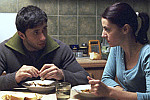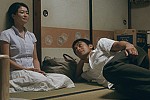 Shadows off the beaten path
Shadows off the beaten path< < F O R E I G N
last update 10.Jan.10
See also: SHADOWS FILM FESTIVAL
 R E V I E W B Y R I C H C L I N E
R E V I E W B Y R I C H C L I N E Politist, Adjectiv
Politist, Adjectiv
with Dragos Bucur, Ion Stoica, Irina Saulescu, Vlad Ivanov, Radu Costin, Cosmin Selesi, Adina Dulcu, George Remes, Alexandru Sabadac, Anca Diaconu, Dan Cogalniceanu, Marian Ghenea
 release US 23.Dec.09
release US 23.Dec.0909/Romania 1h55
CANNES FILM FEST
TORONTO FILM FEST
 Including all those dull moments that are left off-screen in other cop movies, this dry, slow-paced Romanian drama portrays the tedium of an investigation with remarkable realism, dry humour and a quietly political kick.
Including all those dull moments that are left off-screen in other cop movies, this dry, slow-paced Romanian drama portrays the tedium of an investigation with remarkable realism, dry humour and a quietly political kick.
Cristi (Bucur) is a young detective assigned to follow up on a complaint the teen Victor (Costin) made against his friend Alex (Sabadac), accusing him of selling hashish. But Cristi knows something is up, and decides to look for the suppliers instead. His superiors aren't interested in this, and want him to apply the full force of the law, even though this will mean that the essentially innocent Alex could end up in jail for four years for doing something that's not even illegal in the rest of Europe.
Shooting in long, static takes, Porimboiu catches the moment-by-moment solitude of Cristi's life, from his eventless stakeouts to the solitary dinners at home when his work clashes with the schedule of his schoolteacher wife (Saulescu). Much of the film is made up of extended scenes in which nothing much happens, but this is precisely Porimnoiu's point, and viewers need to have the patience to catch the tiny details along the way in order to understand what the film is getting at.
In other words, this is an art film for lovers of challenging cinema. But it's also a remarkably astute look at the lonely life of a jobbing cop, with the levels of bureaucracy, strained relationships and isolation from his friends. A mention of Cristi's "foot-tennis" club early on keeps us wondering what that might be, and we do eventually get a hilarious glimpse. The concluding extended scene in which he is forced to finally confront his boss, who wants him to follow the letter of the law rather than his understanding of right and wrong, packs a few terrific punches.
This is a subtle, clever film that is far too obtuse for mainstream audiences. Expert camerawork and transparent performances that don't even seem like acting make it technically proficient, as does the sparse but astute dialog. But with so little happening from scene to scene, most viewers will simply give up. Which is a shame, because the film has something powerful to say to all of us about control and legalism.
3.Jan.10
 R E V I E W B Y R I C H C L I N E
R E V I E W B Y R I C H C L I N E
prd Yoshihiro Kato, Satoshi Kono, Hijiri Taguchi, Masahiro Yasuda
with Abe Hiroshi, Natsukawa Yui, You, Kiki Kirin, Harada Yoshio, Takahashi Kazuya, Tanaka Shohei, Hayashi Ryoga, Nomoto Hotaru, Kato Haruko, Terajima Susumu

release Jpn 28.Jun.08,
US 28.Aug.09, UK 15.Jan.10
08/Japan 1h54
TORONTO FILM FEST


 With clear echoes of Ozu, this quietly effective slice of Japanese family life has a swirling undercurrent of bitterness and tension. It's also instantly recognisable to anyone who has tried to convince their parents that they're not children anymore.
With clear echoes of Ozu, this quietly effective slice of Japanese family life has a swirling undercurrent of bitterness and tension. It's also instantly recognisable to anyone who has tried to convince their parents that they're not children anymore.
On the 15th anniversary of their golden-boy son's death, Toshiko and Kyohei (Kirin and Yoshio) have a special dinner party for their surviving children. Son Ryota (Hiroshi) brings his wife (Yui) and her son (Shohei) from her late first husband. Daughter Chinami (You) brings her smiley husband (Kazuya) and their two children (Ryoga and Hotaru). But it's clear that the parents haven't moved on from their other son's death, and they can't face the fact that their other children have grown up to have lives of their own.
Shot in a gentle, unfussy style, the static camerawork sharply catches the icy relationships and cutting barbs of dialog. Filmmaker Kore-eda also builds an outrageously oppressive sense that the dead son is still very much part of the parents' lives; it's as if he died yesterday and they're still holding the wake. They also still hold a nasty resentment toward the young boy--now a grown man--their son died rescuing. But their harshest judgement is held for Ryota, who they still see as the black sheep of the family despite all evidence to the contrary.
Kore-eda captures the intense pressure of expectations with subtle insight and a warm sense of humour that's honest and edgy. From banal conversations to backhanded insults, it's what isn't said that makes the difference. And the script tellingly examines generational issues from parents to children to grandchildren, constantly surprising us with sharp details and lovely revelations about who these people really are behind the images others have of them.
This is a rich, liberating film that really captures conflicting feelings we can all identify with: the deep desire to reconnect with our family members and also the need to get away from our parents and siblings so we can be ourselves again. Even though everything seems civilised on screen, the film exquisitely observes this awkward truth with wisdom, artistry, humour and an understanding that love, respect and regret come as a package.
24.Dec.09


See also: SHADOWS FILM FESTIVAL
© 2010 by Rich Cline, Shadows
on the Wall